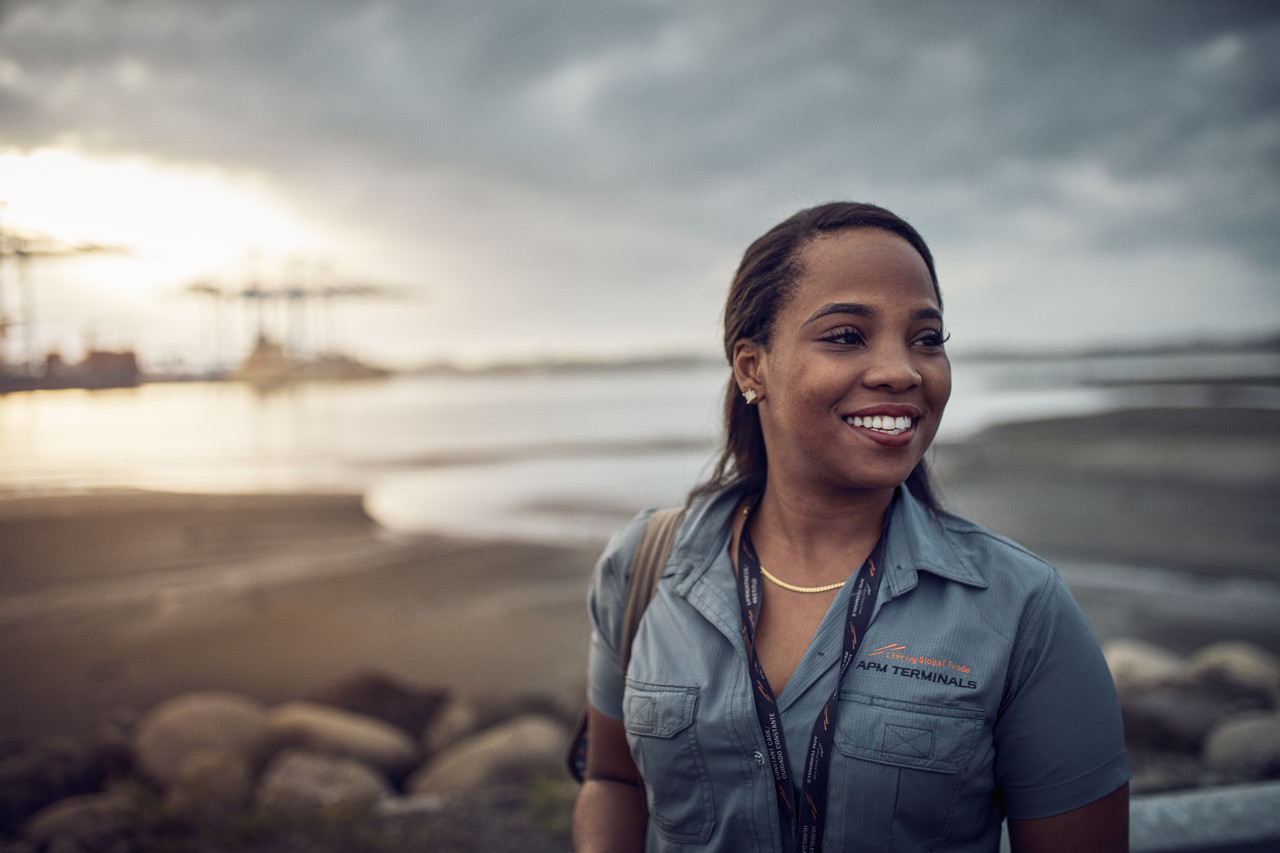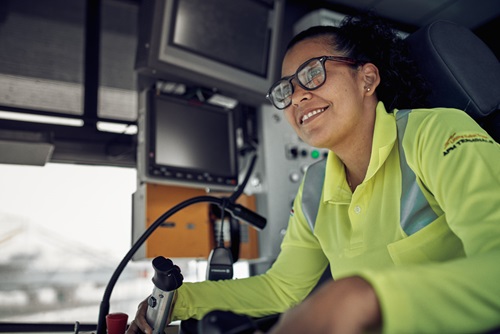
10/07/2020
Gender equality grows in the maritime and port world
Moín Container Terminal stands out for its female inclusion goals
For the second time already, APM Terminals received the Gender Equality Seal granted by the INAMU (Instituto Nacional de las Mujeres, National Women’s Institute) in Costa Rica for its talent management aimed at closing gaps between men and women and practices for gender equality in the value chain. Marliz Bermudez, Commercial Director for Latin America at APM Terminals shares more details in an interview with the Costa Rican magazine La Republica.
Marliz Bermudez, Commercial Director of APM Terminals for Latin America, is not new in the ports and terminals area. Her career in the industry started with merchant marine ships in 2003, she worked in operats area of shipping companies and later became part of the team at the Lázaro Cárdenas Terminal in Mexico, where she had a great task of inaugurating the facility, worth $ 900 million in investments.
Today, Bermudez sits in the regional office of APM Terminals, part of Maersk, from where she supervises and leads the commercial strategy of the eleven terminals that the company has in Latin America.
In addition, she also established a group of women from the port sector in Mexico and is part of the Womens Internartional Shipping and Trade Association (WISTA), based in Panama.
We had the opportunity to chat with Marliz on the occasion of the International Port Women's Day and this is an excerpt from the interview.

What are the policies for the inclusion of women in port activities promoted by APM Terminals?
We operate in a traditionally male-dominated industry, so naturally our approach to diversity, from the very beginning, was geared towards increasing female talent at all levels, as well as increasing different nationalities.
Is there a goal for female participation in APM Terminals’ operations?
It is always a growing effort. Our company selects, recruits and hires personnel taking diversity and inclusion policies into account, which helps ensure that the female quota is always increasing.
How is Costa Rica doing in terms of women's participation in port activities compared to Latin America?
The experience we see from the region is that Moín managed to establish clear goals in its process of including women in the port sector. Since their training, we hear the stories of housewives, single mothers or young women who dared to get certified on our campus, while the terminal was being built and today, they are working for us and for the country in this important concession worth $ 1 billion.
How many women work in Moín and what percentage do they represent in the entire staff?
In the Moín Container Terminal and in the administrative team of APM Terminals in Costa Rica, 20% are women; not negligible, if we compare the terminal with others with a longer history in the world.
How many women there are and what percentage do they represent in the global operations of APM Terminals?
The percentage of female representation globally is around 29%. We have made a lot of progress over the years, in 2013 only 7% of our leaders were women, today that percentage has increased to 18%. We still have some way to go, so we continue to focus on pushing for greater gender parity.
How complicated is it to invite women to get involved in this sector, considering that it has been seen as a men's activity from the perspective of the “macho” bosses?
One is surprised by the myths surrounding port activity. In my experience, certainly at the beginning there may be some reluctance to apply for port jobs, but we have had a very positive experience in the terminals where we have women in all functions, from crane operators, truck drivers, being in charge of planning of the container yard and also leaders, who inspire this paradigm shift.
What results worth highlighting has APM Terminals had with the participation of women in its operations?
They contribute to reaching the goals of productivity and constant improvement, alongside their colleagues. I believe that, in my experience, there is a huge opportunity for more and more women to take a step forward and start a promising career in the logistics industry.
Is a woman treated the same compared to men in terms of salary, job opportunity, conditions?
Yes, absolutely, it is one of our equality policies.
What are the main virtues of women?
Women bring along their life experiences, training and skills that are crucial for the performance, development and success of a company. McKinsey found in a study that companies with an above-average level of gender equality are 15% more likely to outperform those that lag behind in terms of gender diversity.
INCLUSION POLICIES
APM Terminals is governed by four priorities in pursuit of an inclusive culture:
- Involve employees through initiatives, such as the celebration of diversity and inclusion week and the MIX Maersk programme, where they promote spaces to listen and empower teams to continue being part of the culture of our company.
- Development of inclusion capabilities, with regular organisation of workshops on inclusion and overcoming biases, to ensure that diversity and inclusion are always part of leadership programmes and competencies.
- Programme to empower and encourage leaders to create their own diversity and inclusion agendas to achieve internal change and promote their replication among the rest of the collaborators.
- Integrate diversity and inclusion in all people processes: parental leave, mental health, hiring, talent management, etc.
*Originally published in La Republica.
APM Terminals Dashboard Login
Creating an APMTerminals.com account allows you to:
- Subscribe to our Global or Terminal Newsletters
- Set up Terminal Alerts (SMS or Email)
- Save import containers to your Container Watchlist and set up container Email Notifications
- Use our integrated Truck Appointment System - limited terminals
- Request additional services online - limited terminals